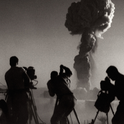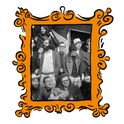I’m on a flight from Heathrow to Los Angeles, in seat 35b. We’ve only been in the air an hour but already my legs have seized up. A man in my row is reading a Michael Crichton, a woman is watching Colin Firth in A Single Man. I’ll be filming in LA for a month, trying to tell the story of Hollywood’s zero sum game between glamour and the gutter—and I’ll report back on what I find next month. For now, though, thoughts of movie satire are keeping me awake. Why? Several reasons. Chris Morris’s film Four Lions, a suicide bomber spoof, is released in May. A new Robocop film is being made, so it’s time to mock and marvel at law enforcement again. And I’ve just re-read the brilliant chapter on satire in Frank D McConnell’s 1979 book Storytelling and Mythmaking: Images from Film and Literature. My favourite satirical movie is probably Djibril Diop Mambéty’s Senegalese gobsmacker Hyènes, but given my destination it’s American film that’s on my mind. Frank McConnell was a professor of English. His ideas and mine are mixing with the roar of the airplane and the wooze of pinot grigio. Here are six of our ideas. I’ll test each one against the evidence. The first is that satire is the mode of art that becomes more prevalent at times of demoralisation. So says Frank. Yet the 1930s had the Marx brothers; the 1940s had the Bob Hope and Bing Crosby Road To movies; in the 1950s there were the Jerry Lewis films, including Frank Tashlin’s Artists and Models; the 1960s had Buck Henry and Mike Nichols’s The Graduate. In the 1970s, riding perhaps on RD Laing’s thought that at a time of insanity, the schizophrenic is the sanest person in the room, there was Milos Forman’s One Flew Over the Cuckoo’s Nest. In the 1980s and 1990s there was Robocop and Starship Troopers, among many others. So there has always been screen satire. Our second idea (I write as if Frank is in seat 35a, but he isn’t: he died in 1999) is that satire is a “late style.” Not historically so, but in terms of the cycle of storytelling—it comes after epic stories about kings, romantic tales of courts and courtship, and melodramas about detectives. As far as movies go, this is sort of true. Westerns are epics in which John Wayne plays the lawmaker. Musicals are often about knights, damsels and courtship. Films noir are crime-soaked portraits of worlds where the law is in jeopardy. And, well, in Robocop, the pictures of the Marx brothers and Jerry Lewis, the law is an ass. To this add the fascinating example of filmmaker Stanley Donen, who made the romantic On the Town in his youth but, 28 years later, hurled Bedazzled, with Peter Cook and Dudley Moore, in all its caustic glory, on to the big screen. Our third idea is that satire is Saturnalian, a world where everything is upside down. The undervalued screen version of Joseph Heller’s Catch-22 is an espresso hit of this idea. Yossarian, the US Air Force bombardier, wants to be declared mentally unfit to fly since anyone flying such dangerous missions must be insane. But to ask for medical evaluation must mean he is sane, therefore he must keep flying. Our fourth idea is that unlike, say, film noir, which is painted in grey and black, satire is a chromatic carnival. In Britain this isn’t so—think of the surface realism of The Office and In the Loop—but in the US there’s some truth in this. Starship Troopers is baroque. Bob Hope breaks the “fourth wall” by talking to the camera. But M*A*S*H was hypernaturalistic in terms of sound recording and shooting, and that’s what makes it work. Our fifth idea comes from the observation that there is something very reassuring, even placatory, in watching Eisenhower’s America, or the political class that thought that the Vietnam war was a good idea, being mocked by the “representatives of chaos” (Frank’s lovely phrase). It’s worth asking, for example, what happens to Benjamin Braddock when he gets off the bus he boarded with Elaine Robinson at the end of The Graduate? Does he become a representative of chaos or a salaryman like Jack Lemmon in Billy Wilder’s The Apartment? Just one hour has elapsed since I started writing this. There are another nine to go, which is annoying. But I notice that The Graduate is on the in-flight entertainment list, so I’ll watch it. As you might remember, its first line is “Ladies and gentlemen, we are about to make our descent into Los Angeles.” My final thought comes from playwright George S Kaufman: “Satire is what closes on Saturday night.” It’s Saturday night according to my body clock but, because I’m flying west, it will be again when I get off the plane.

Widescreen
What better way to while away an hour of a long flight to LA than to muse on the nature of film satire with a dead professor?
April 26, 2010











